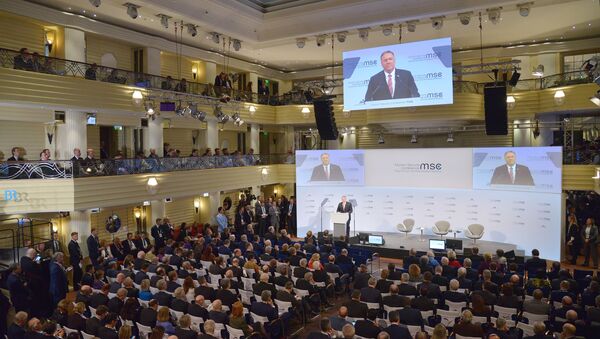A security report, titled 'Westlessness' and unveiled shortly before the beginning of the 2020 Munich Security Conference, actually defined a vector of discussions held at the two-day event, which will conclude later in the day. Here are some of the gathering’s highlights.
Phantom 'Russian Threat’
The Russian delegation at the conference is led by Foreign Minister Sergey Lavrov, who during his speech called on the West to "give up on promoting the phantom of the 'Russian threat'" and start a dialogue.
He pointed to a “crisis of confidence in European affairs”, singling out NATO’s eastward expansion and “unprecedented” military exercises near Russia's borders, which Lavrov said “generates unpredictability”.
He also recalled Russian President Vladimir Putin’s recent proposal to convene a summit of the five permanent members of the UN Security Council, including Russia, the US, the UK, France and China. The goal of the summit is to make recommendations for improving the international climate and restoring trust between major global players, according to Lavrov.
Separately, Lavrov warned against historical revisionism related to the Second World War. He regretted the fact that on eve of the 75th anniversary of the Victory in Europe, many countries "put on the same board the Nazi executioners and the liberators of Europe”.
Macron Rejects Pompeo’s ‘West Winning’ Claims
Speaking at the Munich Security Conference, US Secretary of State Mike Pompeo, for his part, upheld the White House’s foreign policy stance, dismissing concerns that the Trump administration disregards international alliances.
“I’m happy to report that the death of the transatlantic alliance is grossly exaggerated. The West is winning, and we’re winning together”, Pompeo argued.
His claims, however, were rejected by French President Emmanuel Macron, who warned of “a weakening of the West” during his speech at the Munich gathering, where Macron also asserted that the US was undergoing “a rethink of its relationship with Europe”.
“We need a European strategy that renews us and turn us into a strategic political power,” Macron pointed out.
Three Seas Initiative
The US Secretary of State meanwhile also touched upon what he described as the EU’s dependence on Russian gas, signalling Washington’s readiness to finance energy projects in Eastern European countries.
“The United States - through our International Development Finance Corporation, and with the support of the US Congress - intends to provide up to $1 billion in financing to the Central and Eastern European countries of the Three Seas Initiative,” Pompeo said, calling for “galvanising private sector investment in their energy sectors”.
The initiative’s combined area connects the Adriatic Sea, Baltic Sea, and Black Sea, bringing together twelve countries located in Central and Eastern Europe. The aim is to create a regional dialogue on a spate of issues affecting member states.
Steinmeier Refutes Trump’s ‘America First’ Policy
During his opening speech at the Munich forum, German President Frank-Walter Steinmeier, in turn, slammed US counterpart Donald Trump’s “America First” foreign policy approach, arguing that Washington now puts its own interests first at the expense of its “closest allies”.
“Our closest ally, the United States of America, under the current administration, rejects the very concept of the international community,” Steinmeier noted, adding that the Trump administration callously described the nation as “great again”, but “at the expense of neighbours and partners”, referring to the Trump campaign slogan without naming the US President.
According to Steinmeier, the Trump administration's foreign policy platform “hurts us all”.
Zelensky Says He Wanted ‘to Be Popular in the US’
Additionally, it is worth mentioning the Munich gathering speech by Uk,rainian President Volodymyr Zelensky, who said that he had wanted to become popular in the US as an actor, rather than as a result of his phone conversation with the US President, when asked about his attitude toward the failed impeachment probe against Donald Trump.
“In my previous life, in my previous profession, when I was a producer or a screenwriter or an actor, I dreamed of getting an Oscar, I sought to become very popular in the US. I am now president, and very popular in America. But, listen, I didn't want that. That's not the kind of popularity I'd been seeking,” he said.
The Democrats launched impeachment proceedings against POTUS in September 2019, accusing Trump of abusing power during his phone conversation with Zelensky in the summer of that year, when Trump allegedly pressured the Ukrainian President to endorse a probe into former US Vice President Joe Biden’s activities in Ukraine.





